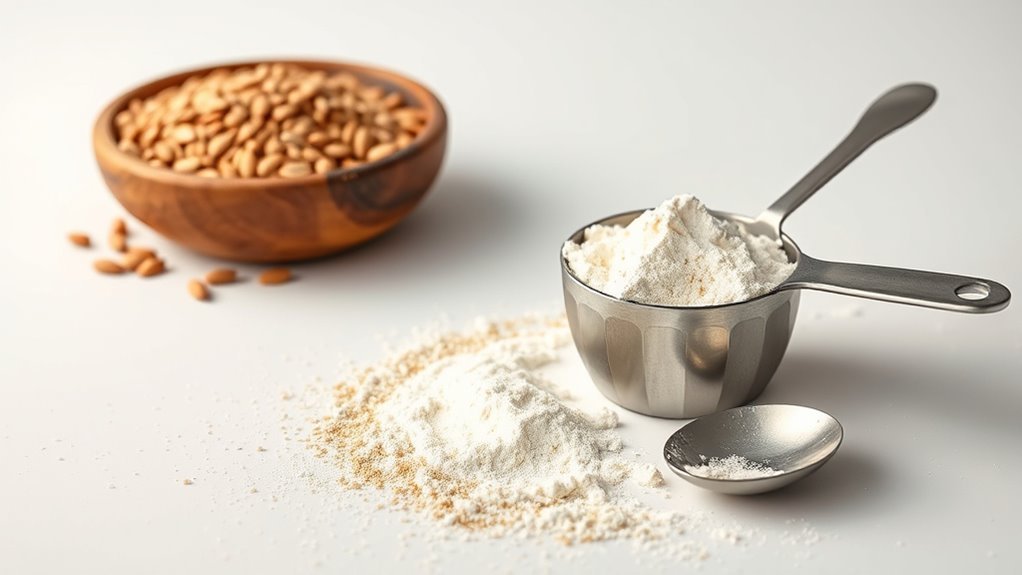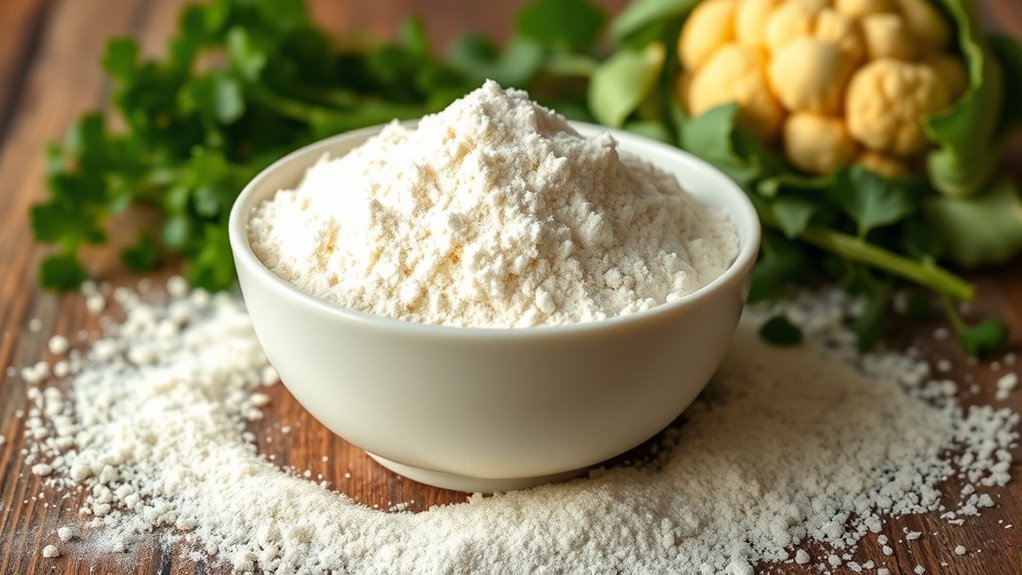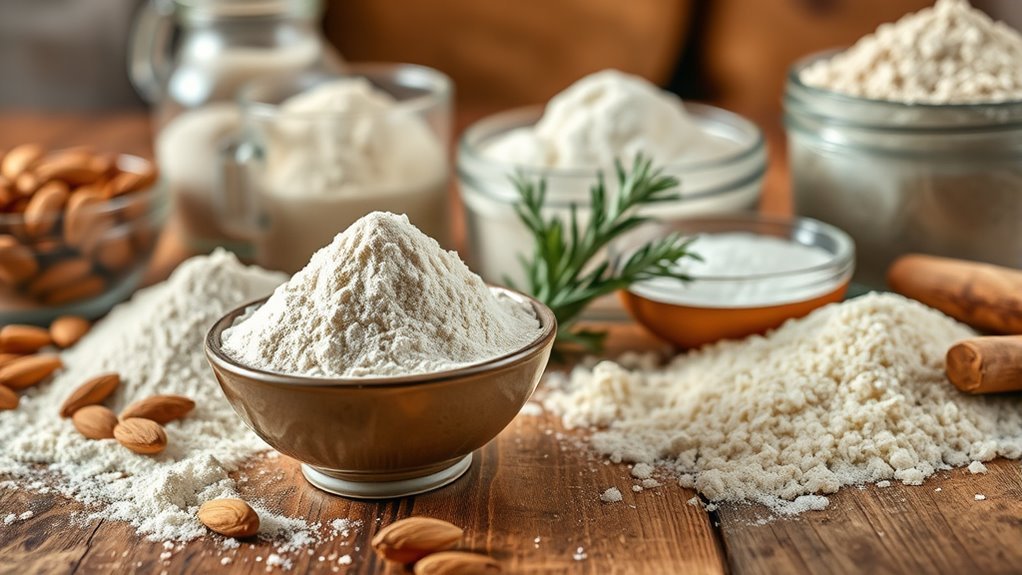Traditional wheat flour isn’t keto-friendly due to its high carb content, which can disrupt your ketosis and hinder fat burning. It triggers insulin responses that can lead to increased hunger and cravings. Instead, consider low-carb alternatives like almond or coconut flour. These nut flours are rich in healthy fats and fiber, supporting your health goals. If you want to master keto baking and learn more about flour substitutions, there are plenty of options to explore.
Understanding the Basics of Keto and Carbohydrates

When you’re exploring the ketogenic diet, it’s essential to understand how carbohydrates fit into the picture. The keto principles emphasize minimizing carb intake to promote ketosis, where your body burns fat for fuel. Carbohydrate types matter considerably; not all carbs are created equal. Simple carbs, like sugars, can spike insulin levels and hinder your progress. In contrast, complex carbs, found in vegetables, can be more compatible with a keto lifestyle, especially when consumed in moderation. Focusing on fiber-rich, low-carb vegetables can help you meet your nutritional needs while staying within your carb limits. By understanding these different carbohydrate types, you can make informed choices that align with your keto journey and enjoy the freedom it offers. Tracking carb intake is crucial for staying within your daily limits and maintaining ketosis.
Traditional Wheat Flour: A Keto No-Go

Traditional wheat flour is packed with carbohydrates, making it a poor choice for those on a keto diet. Consuming it can disrupt your state of ketosis, which is essential for burning fat for energy. Fortunately, there are alternative flour options available that align better with your dietary goals. Using low-carb alternatives can help maintain your desired macronutrient balance while still enjoying baked goods.
High Carbohydrate Content
Flour, particularly traditional wheat flour, is notorious for its high carbohydrate content, making it a poor choice for those following a ketogenic diet. With about 90 grams of carbs per 100 grams, it stands as a significant carbohydrate source that can quickly derail your efforts to maintain ketosis. For those with dietary restrictions, the inclusion of wheat flour can lead to unwanted spikes in blood sugar levels and hinder your overall health goals. Instead, you might want to explore low-carb alternatives like almond or coconut flour. These options not only fit better within the keto framework but also allow you to enjoy baking without compromising your commitment to a low-carb lifestyle. Choose wisely to stay on track!
Impact on Ketosis
While many enjoy the versatility of traditional wheat flour in baking, its impact on ketosis can be detrimental for those on a ketogenic diet. Consuming wheat flour can hinder your keto adaptation and trigger an insulin response, which might kick you out of ketosis. Here are a few points to reflect on:
- Carbohydrate Load: Wheat flour is high in carbs, making it a poor choice for maintaining ketosis.
- Blood Sugar Spikes: The insulin response can lead to elevated blood sugar levels, countering your keto goals.
- Ketone Production: High carb intake limits your body’s ability to produce ketones for energy.
- Cravings: Traditional flour can increase hunger and cravings, making it harder to stick to your diet.
Ultimately, traditional wheat flour isn’t conducive to a successful ketogenic lifestyle. Additionally, limiting carbs is essential for maintaining ketosis and supporting effective weight loss.
Alternative Flour Options
If you’re seeking alternatives to wheat flour that align with a ketogenic diet, several options can help you maintain your carb limits without sacrificing your baking endeavors. Nut flours, like almond or coconut flour, offer numerous benefits, including higher protein and healthy fats, making them ideal for keto. These flour types require different baking techniques, such as adjusting liquid ratios or baking times, but they can yield delicious results. For instance, almond flour can create moist, dense baked goods, while coconut flour absorbs more moisture, so you’ll need to use less. By experimenting with nut flours, you can enjoy your favorite treats while staying on track with your ketogenic lifestyle, embracing both creativity and health. Additionally, coconut flour is lower in carbohydrates compared to traditional wheat flour, making it a favorable choice for those aiming to reduce their carb intake.
Almond Flour: A Popular Keto Alternative

As you explore keto-friendly options, almond flour emerges as a favored alternative for those seeking to reduce their carbohydrate intake. It’s low in carbs and packed with nutrients, making it a go-to for many. Here are some almond benefits and recipes to take into account:
- High in healthy fats: Supports heart health and helps you feel full.
- Rich in fiber: Aids digestion and promotes gut health.
- Versatile in cooking: Use it in pancakes, bread, cookies, and more.
- Low glycemic index: Helps maintain stable blood sugar levels.
Incorporating almond flour into your diet allows you to enjoy delicious meals while staying on track with your keto journey, and it can provide essential vitamins and minerals that contribute to overall wellness. So, get creative with those almond recipes and savor the benefits!
Coconut Flour: Low-Carb and Versatile
Coconut flour is another excellent low-carb option for those following a keto diet, offering a unique flavor and texture that can enhance various recipes. It’s high in fiber and low in carbohydrates, making it a great choice for maintaining ketosis. The coconut benefits extend beyond just low carbs; it’s rich in healthy fats and protein, which can support your overall wellness. You can easily incorporate coconut flour into your baking, from pancakes to bread, creating delicious coconut recipes that satisfy your cravings. Just remember, it absorbs more moisture than regular flour, so adjust your liquid ingredients accordingly. With its versatility and nutritional profile, coconut flour can be a fantastic addition to your keto cooking repertoire. Additionally, using coconut flour can help you maintain low carbohydrate intake, which is essential for achieving and sustaining ketosis.
Other Nut Flours: Options to Consider
While many people associate keto diets with coconut flour, other nut flours can also be excellent options for low-carb baking. Here are some nut flours you might want to examine:
Many associate keto diets with coconut flour, but other nut flours offer great low-carb baking alternatives.
- Peanut Flour: With its high protein and low carb count, peanut flour can add a rich flavor to your recipes.
- Hazelnut Flour: This flour is not only deliciously nutty but also packed with healthy fats and fiber, keeping your carbs in check.
- Almond Flour: A popular choice, it’s versatile and works well in various baked goods, and it’s also low in carbohydrates, making it ideal for keto baking.
- Macadamia Nut Flour: This option is high in fat and low in carbs, perfect for keto-friendly treats.
Exploring these options can help you enjoy a variety of flavors while staying within your dietary goals.
How to Substitute Flour in Your Recipes
When you’re looking to substitute flour in your recipes, understanding the unique properties of each alternative is essential. Popular flour replacements include almond flour, coconut flour, and flaxseed meal. Almond flour is great for moisture, while coconut flour absorbs more liquid, so you’ll need to adjust your baking techniques accordingly. For every cup of almond flour, you might use a quarter cup of coconut flour, along with extra eggs for binding. Additionally, consider using psyllium husk for added fiber and texture. Each substitute has a distinct flavor and texture that can impact your dish, so experimenting with ratios and combinations will lead to the best results. Embrace the freedom to create delicious, flour-free recipes! Incorporating low-carb vegetables into your meals can also enhance the overall health benefits of your keto journey.
Tips for Baking on a Keto Diet
Baking on a keto diet can be a rewarding experience if you know how to navigate the unique challenges it presents. Here are some tips to enhance your keto baking:
- Choose Low-Carb Flours: Almond flour and coconut flour are excellent substitutes that keep your carb count low.
- Watch Your Sweeteners: Use erythritol or stevia instead of sugar to maintain sweetness without the carbs.
- Adjust Liquid Ingredients: Keto-friendly flours absorb more liquid, so you might need to tweak your recipes accordingly.
- Experiment with Binders: Since keto baking lacks gluten, consider using eggs or xanthan gum to help bind your ingredients. Additionally, using almond flour can provide healthy fats and protein which are beneficial for maintaining energy levels.
Frequently Asked Questions
Can I Use Gluten-Free Flour on a Keto Diet?
You can use gluten-free flour on a keto diet, but you’ll need to choose wisely. Many gluten-free alternatives, like almond flour or coconut flour, are low in carbs and great for keto baking. However, be cautious with options like rice flour or oat flour, as they can be higher in carbohydrates. Always check labels and nutrition facts to guarantee you’re staying within your carb limits while enjoying your favorite baked goods.
What Are the Carb Counts for Different Flours?
When you’re baking a cake with almond flour instead of regular flour, you’ll notice a significant difference in carb counts. For instance, almond flour has about 10 grams of carbs per 100 grams, while all-purpose flour can have around 76 grams. This carb comparison highlights the benefits of flour alternatives for those seeking low-carb options. If you’re mindful of your carb intake, choosing the right flour can empower your baking experience.
Are There Any Keto-Friendly Flour Blends Available?
Yes, there are several keto-friendly flour blends available that you can use for low carb baking. Almond flour and coconut flour are popular choices, often used in combinations for better texture. You might also look for pre-made keto flour substitutes that blend these with other low-carb ingredients, providing a more versatile option. Always check the carb counts, as they can vary. These alternatives can help you enjoy baking while sticking to your keto lifestyle.
How Do I Store Keto Flours?
To store keto flours effectively, use airtight containers to keep moisture and pests out. You’ll want to choose a cool, dark place, like a pantry, for best results. Some flours can even be refrigerated or frozen to extend their shelf life. Make certain to label your containers with the date you opened them, so you can track freshness. Following these storing techniques guarantees your keto flours stay in great condition for your recipes.
Can I Make My Own Keto Flour at Home?
Absolutely, you can make your own keto flour at home! Just think about the satisfaction of crafting your own low carb ingredients. Almond flour, coconut flour, and even flaxseed meal are excellent options. Simply grind these ingredients in a blender or food processor until they reach a fine consistency. With homemade flour, you control the quality and can tailor it to your taste, ensuring your keto journey feels both personal and liberating.
References
- https://www.ncbi.nlm.nih.gov/pmc/articles/PMC6472243/
- https://www.healthline.com/nutrition/what-is-keto-diet
- https://www.webmd.com/diet/obesity/keto-diet
- https://www.mayoclinic.org/healthy-lifestyle/nutrition-and-healthy-eating/expert-answers/keto-diet/faq-20458658
- https://www.cdc.gov/healthyweight/healthy_eating/index.html
- https://www.ncbi.nlm.nih.gov/pmc/articles/PMC6272276/


